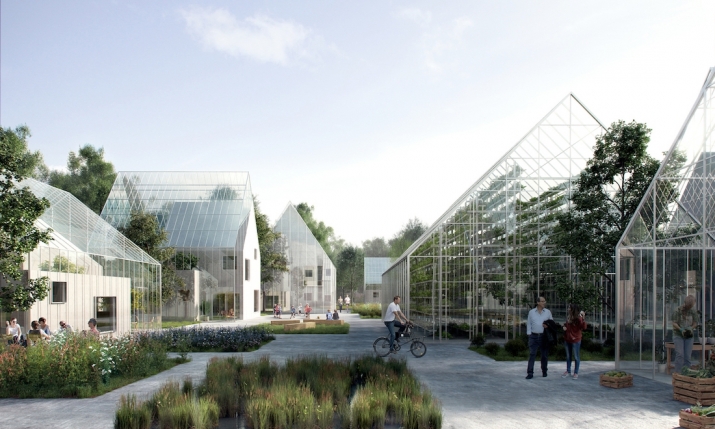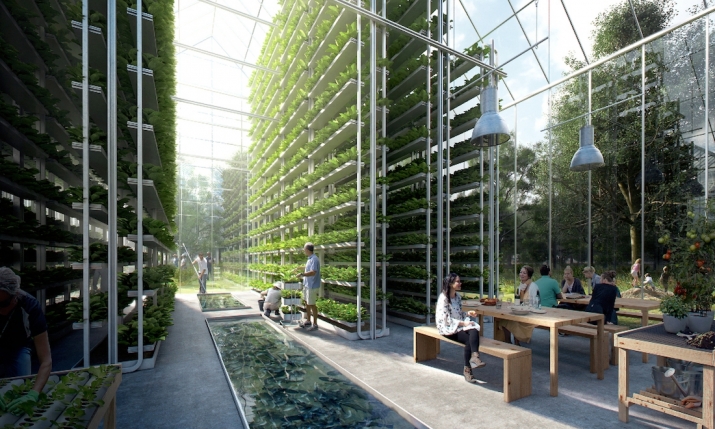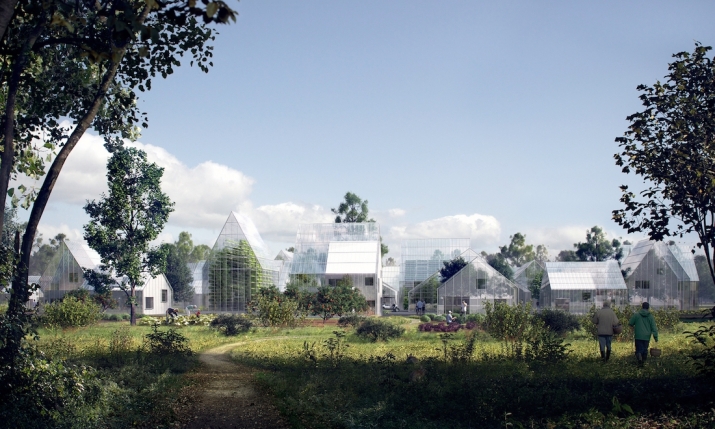NEWS
Revolutionary Self-sustaining Eco-village Planned in the Netherlands
 The community will rely on alternative energy, such as geothermal, solar, wind, and biomass sources. From effekt.dk
The community will rely on alternative energy, such as geothermal, solar, wind, and biomass sources. From effekt.dkA radical experiment in sustainable living is currently underway in the Netherlands in the form a hi-tech, self-sustaining eco-community planned in the municipality of Almere, some 20 minutes from Amsterdam. Utilizing a range of innovative technologies, the village is touted as a possible long-term solution to the multitude of imminent environmental crises, such as climate change and food and water shortages, by enabling more efficient, sustainable lifestyles.
The planned neighborhood, designed to be principally a farming community, will feature a total of 100 homes, with the first 25 due to be completed in about a year. By managing its own waste, producing its own food, recycling water, and generating its own energy, the objective is to demonstrate that it is possible to create sustainable, closed-loop communities in which almost all of the residents’ day-to-day needs—from food to power—are sourced from within and by the community. The neighborhood is expected to serve as a prototype for future eco-villages planned in Denmark, Germany, Norway, and Sweden.
Key to the issues of urbanization, housing, and resource scarcity is food production, according to Sinus Lynge, co-founder of Danish architectural firm EFFEKT, which has partnered with Californian residential real estate developer ReGen Villages for this initiative. “Today we spend 40 per cent of the surface of our continents producing food,” said Lynge. “Food production is the single largest emitter of greenhouse gasses, the biggest driver of deforestation and responsible for 70 per cent of our global freshwater consumption. We ship our food from one end of the world to another just to waste 30 per cent of the total production before consumption—and still 1/7 of the global population goes to bed hungry—we just have to come up with better models and ReGen is one of them.” (The Science Explorer)
 The community will employ high-yield food production through vertical farming utilizing aquaponics and aeroponics. From effekt.dk
The community will employ high-yield food production through vertical farming utilizing aquaponics and aeroponics. From effekt.dkSome of the innovative technologies that will be integrated into the community include alternative energy sources such as geothermal, solar, wind, and biomass, energy storage, high-yield food production through vertical farming utilizing aquaponics and aeroponics, advanced water management, and waste-to-resource systems. The community will also feature communal dining, playgrounds, and community learning centers, along with charging stations for electric vehicles.
“Our modern lifestyle is utterly unsustainable and this calls for more resilient solutions for the future,” said Lynge. “The technology already exists, it is just a matter of applying science into the architecture of everyday life.” (Nextshark)
Aquaponic farming systems, for example, can decrease land use by 98 per cent, freeing up land for biodiversity and permaculture. Aquaponics will also decrease water use by 90 per cent. And because the farming is on site, transportation costs are eliminated.
“We anticipate literally tons of abundant organic food every year—from vegetables, fruit, nuts, legumes, fish, eggs, chicken, small animal dairy and protein—that can continually grow and yield in the vertical garden systems all year long as supplement to the seasonal gardens and farming adjacent,” said ReGen Villages founder James Ehrlich. (Co.Exist)
 The community will also feature communal dining, playgrounds, and community learning centers, along with charging stations for electric vehicles. From effeckt.dk
The community will also feature communal dining, playgrounds, and community learning centers, along with charging stations for electric vehicles. From effeckt.dkOnce the viability of the model is proven, Ehrlich aims to adapt the concept to create sustainable communities in climates and geographies across the world, with plans to look at the Middle East after Europe. “We tackle the first two hardest climate areas,” said Ehrlich. “Then from there we have global scale—rural India, sub-Saharan Africa, where we know that the population is going to increase and also be moving to the middle class. If everybody in India and Africa wants the same kind of suburbs that we’ve been building so far, the planet’s not going to make it.”
See more
This New Neighborhood Will Grow Its Own Food, Power Itself, And Handle Its Own Waste (Co.Exist)
Self-Sufficient Eco-Village to Begin Construction in the Netherlands This Summer (The Science Explorer)
Regen Villages: California Company to Build What Will Be the ‘Tesla of Eco-Villages’ (Nextshark)
Self-sustaining eco village of 100 homes creates off-the-grid prototype (Stuff)
ReGen Villages
EFFEKT














